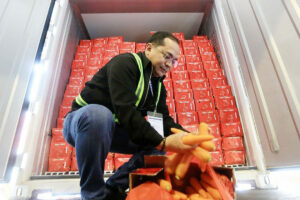THE farm industry said the need for first border inspection facilities at ports remains urgent to deter smuggling or dangerous produce.
Gregorio A. San Diego, Jr., chairman of the United Broiler Raisers Association (UBRA) and the Philippine Egg Board Association, said cold examination facilities for agriculture (CEFA) are “very long delayed.”
“What is happening (under the current system) is what they call the open-close policy,” which consists of a visual inspection of the goods near the container door,” Mr. San Diego said in a Viber message.
Federation of Free Farmers National Manager Raul Q. Montemayor said such inspection facilities will check the container’s contents, determine their tariff classification, weight or volume, value, quarantine clearance, and other parameters.
A first border inspection facility “will obviously be resisted by persons who are gaining from the current system” because they will be prevented from engaging in smuggling, misdeclaration and undervaluation of imports, he said via Viber.
UBRA President Elias Jose M. Inciong added that all imported produce must come with key information that legitimate importers are more likely to comply with.
“It is important to know the (manufacturing) date and (when it was frozen) so that the legal importers can be distinguished from the illegal ones. Right now, there is no distinction,” Mr. Inciong said by phone.
“The problem… is there is no data on the shelf life of these products,” he added.
The Department of Agriculture (DA) on Tuesday seized smuggled frozen meat worth P35 million in Meycauayan City, Bulacan.
Several frozen spoiled meat products, including pork feet, lamb and chicken skin were found, the DA’s Office of the Assistant Secretary for Inspectorate and Enforcement said.
The meat products came from Germany and India, and were found being repacked for sale, the inspectorate added.
The Samahang Industriya ng Agrikultura (SINAG) said the establishment of first border inspection facilities for agricultural imports has entered its “final stages.”
SINAG Executive Director Jayson H. Cainglet said by phone that “since last year, we’ve been talking to the President and the DA and we are in the middle of formalizing the creation of a CEFA in Bulacan,” he said by phone.
The DA initially set the creation of the first CEFA in 2019 in Subic, with P500 million in funding, to address the African Swine Fever crisis, but this failed to proceed.
“President Marcos is left holding the bag and he is the one who is expected right now by everyone to execute it,” Mr. Inciong said.
Mr. Cainglet also cited the need to amend the Anti-Agricultural Smuggling Law by allowing other parties to charge smugglers. Such amendments would also create a special court to handle these cases. “Under the agri-smuggling law, only the BoC (Bureau of Customs) can file cases against smugglers.”
The amendments are pending in committee at both the House and Senate. — Beatriz Marie D. Cruz

